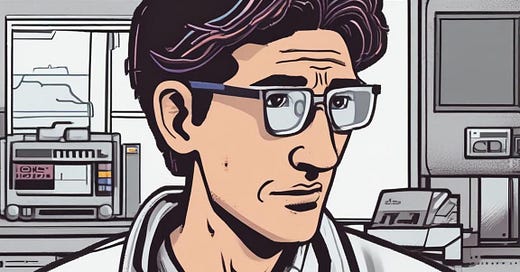Navigating Sobriety: Practical Tips for Staying Strong Through Stress
Staying sober during tough times is crucial
Welcome to the AFFathers newsletter on Substack.
Taking the first step toward sobriety is brave, but it comes with its own set of challenges.
If you’re on the journey to recovery from addiction, dealing with stressful situations is expected. However, staying sober during tough times is crucial for your well-being and growth.
This guide offers practical tips to help you stay sober during times of stress, empowering you to overcome obstacles and embrace a life of clarity and purpose.

Here are some practical tips to navigate stress without turning to alcohol:
Plan ahead
Anticipate potential stressors and develop strategies to manage them proactively.
The University of Colorado Boulder noted: “The best way to handle stress is to be proactive.”
It added: “Using time management skills like planning your schedule, keeping to-do lists and breaking up big assignments into smaller tasks can keep you on track and help you avoid last-minute panic.”
Although aimed at students, it is handy to remember that proper planning can help reduce stress in any of life’s situations.
“Plans are of little importance, but planning is essential.” - Winston Churchill
Identifying triggers and having a plan in place to cope with them is also key to staying on track with sobriety.

Manage stress
“Long-term ongoing stress can increase the risk of hypertension, heart attack, or stroke,” according to the American Psychological Association.
“Repeated acute stress and persistent chronic stress may also contribute to inflammation in the circulatory system, particularly in the coronary arteries, and this is one pathway that is thought to tie stress to heart attack.”
That’s why you must learn stress management techniques such as deep breathing, visualisation, and progressive muscle relaxation.
It’s also important to have a list of healthy activities and hobbies that you can turn to when stressors arise, such as exercise, meditation, or reading – which I will touch upon later!
Setting realistic expectations for yourself in recovery can also be vital to avoid feeling overwhelmed and succumbing to old habits.
“There is only one way to happiness and that is to cease worrying about things which are beyond the power of our will.” - Seneca
Make time for yourself
Self-care may sound like a simple concept, but it’s essential for maintaining your physical and emotional well-being.
That’s why it’s crucial to carve out moments for self-care amidst life’s demands.
Prioritising personal time rejuvenates and equips you to handle stress better, enabling you to stay focused on your sobriety journey.
But it’s not just about pampering yourself, it’s about making sure that you’re meeting your basic needs and addressing any issues that may be standing in the way of your recovery.
Dedicate time to looking after yourself. Embrace relaxation and engage in activities that bring you joy.
Seek support
It is normal to feel isolated and overwhelmed when dealing with the challenges of maintaining sobriety, that’s why surrounding yourself with a supportive network of friends or family is essential.
Joining a support group provides understanding, guidance, and accountability. It can also provide a safe place to share your feelings and experiences without fear of judgement.
This emotional support can help you feel less alone and more supported in your recovery journey.
Support groups aim to provide a non-judgmental environment that can make it easier for you to open up and talk about your struggles and feelings.

Explore healthy activities
Engaging in activities such as exercise, being in nature, meditation, or reading can alleviate stress and improve well-being.
Adopt healthy habits; eat nutritious food, get adequate rest and adopt stress management tools.
Strengthen the connection between your body and mind by prioritising physical fitness, which not only boosts your physical health but also enhances mental clarity and resilience.
Honouring the mind-body connection will help you lay the foundation for a vibrant and fulfilling future in recovery.
Invest in your physical health today and reap the rewards in your recovery.
Here is a fitness program from my friend Jack to get you started:
Relapse plan
A contingency plan is imperative in case of a relapse.
According to familyaddictionspecialist.com, relapse rates for individuals who enter recovery from a drug or alcohol addiction are quite high.
It added: “Studies reflect that about 40-60% of individuals relapse within 30 days of leaving an inpatient drug and alcohol treatment centre, and up to 85% relapse within the first year.”
Experiencing a relapse along your journey of addiction recovery can be disheartening, but I must emphasise this: It doesn’t mean that you’ve failed.
It does not signify the end, but rather, shows the true power of addiction and the importance of taking this journey seriously. Remember, it’s okay to ask for help when needed.
Relapse is just a temporary setback on the long road to recovery.
Seek professional help if needed
If you’re really struggling to stay sober during stressful times, it might be worth seeking advice from a professional. Below, I have listed some steps to take to find someone who will help you and what to do once you’ve found them.
Research: Look for reputable therapists or counsellors who specialise in addiction treatment. Check their credentials and experience to ensure they’re a good fit for you.
Ask for recommendations: Reach out to friends, family, or your support group for recommendations. They may have valuable insights or know someone who can help.
Schedule a consultation: Before committing to a therapist, schedule a consultation to discuss your needs and see if you feel comfortable with them. Ask about their approach to addiction treatment and what to expect from therapy sessions.
Be honest: This one is imperative! When meeting with a therapist, be open and honest about your struggles with addiction. This will help them understand your situation better and tailor their treatment approach to your needs.
Follow through: Once you’ve found a therapist you’re comfortable with, commit to attending therapy sessions regularly. Be open to exploring new strategies and techniques for managing addiction and coping with stress.
Consider other resources: In addition to therapy, consider other resources such as support groups, online forums, or helplines. These can provide additional support and guidance on your journey to recovery.
Stay patient and persistent: Recovery is a process, and it may take time to see progress. Be patient with yourself and stay persistent in seeking help and implementing positive changes in your life.
Conclusion
When life gets chaotic, sobriety serves as a beacon of clarity and strength. By implementing these tips and embracing your recovery journey, you can cultivate resilience and forge a path towards a brighter future.
Remember, recovery isn’t just about abstaining from alcohol; it’s about reclaiming control of your life and finding clarity amidst the chaos. Stay committed to sobriety.
Every step forward is a step towards a life of fulfilment and purpose.
Before you go, here are some useful articles related to today’s post:
Thank you for reading: “Navigating Sobriety: Practical Tips for Staying Strong Through Stress.”
If you enjoyed this article and would like to support me, you can become a paid subscriber. If you’re unable to do this, I’d be very grateful if you’d ‘buy me a coffee’. I’m a stay-at-home dad and every little helps :)
Check out the last post: “Conquering Addiction: Music, Memories and Recovery.”
Take care of yourself and your family,
Roscoe | @AFFathers
Please follow AFFathers on Telegram, Twitter/X, Instagram and Bluesky.
This article was previously uploaded to birthofclarity.com.






Nice one mate ... Lots of good info ...